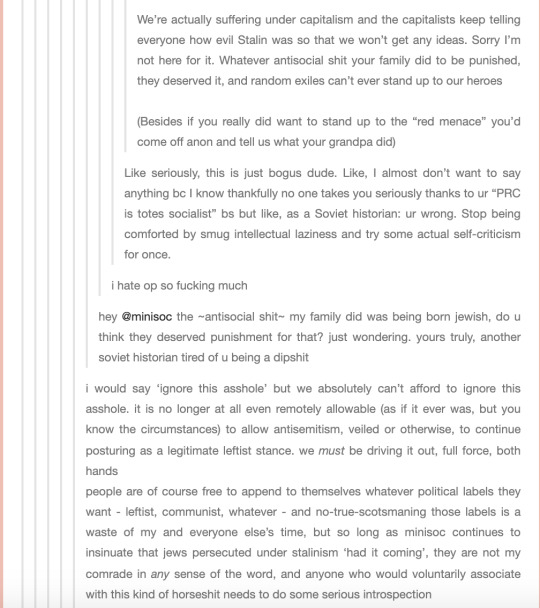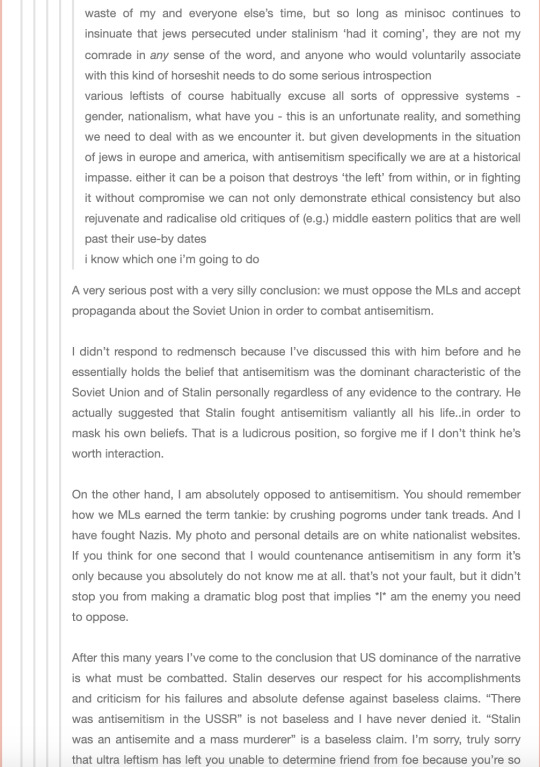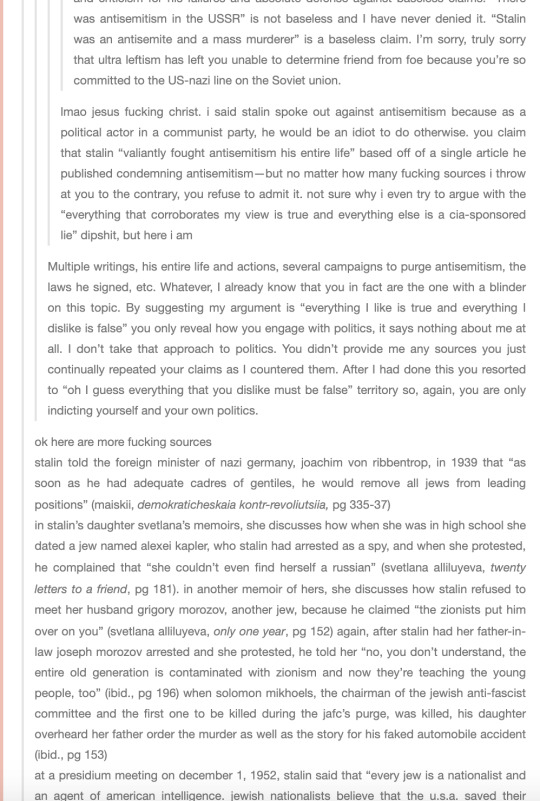Text
https://twitter.com/aubedete/status/1607204812851912704
http://web.archive.org/web/20221227141154/https://twitter.com/oldbooksguy/status/1606389406876585986

Oh by the way, since we are on the topic of Camille Paglia, I always wanted to discuss her sexualized misopedy, so let’s take a look on some of her most memorable quotes on this topic:
Tw: csa, csa apologia
“These days, especially in America, boy-love is not only scandalous and criminal, but somehow in bad taste. On the evening news, one sees handcuffed teachers, priests and Boy Scout leaders hustled into police vans. Therapists call them maladjusted, emotionally immature. But beauty has its own laws, inconsistent with Christian morality. As a woman, I feel free to protest that men today are pilloried for something that was rational and honorable in Greece at the height of its civilization.” -Sexual Personae
Because of course the victims of the institutionalized abuse of children at the hands of powerful institutions are actually… adult men.
It is a shame they are not allowed to act like they used to in the heights of Greek civilisation (own slaves and rape women and children). So much so that the percentage of children who have experienced CSA remains incredibly high, which I imagine makes her happy.
And proves in her mind that they’re still capable of “appreciating beauty,” which here means, to objectify children that are deemed to be “beautiful” because they are perceived as smaller and weaker and devoid of any other quality.
Her belief is that men are persecuted for sexually abusive behavior that she deems to be natural, but the personhood of children isn’t even a concern here. How are “boys” supposed to feel about being merely beautiful objects? Is a child who reports a csa incident themself a heartless brat prosecuting men simply for “appreciating their beauty”? It is unlikely that the answer would be no.
“Worldwide, in Greece and Rome as in the Near East, China, and Japan, pretty boys have usually been considered by men to be as sexually desirable as women. This seems to me perfectly natural. Judeo-Christianity is unusual in finding the practice of boy-love abhorrent.” -Sex, Art, and American Culture
Patriarchal cultures have objectified and sexually abused children, but that is praiseworthy to her. Her comment on Judeo-christian culture is senseless. The multiple sexual abuse cases in the church are testimony to that, and I do not mean just abusive power structures in the church, but a longstanding tradition of objectification of children.
This is without even taking into account the fact that the church always condoned child marriage, and Mary herself was supposed to be 14.
The condemnation of pederasty by the church is exclusively based in the fact that it cannot produce children, and therefore it is sex for only the sake of it, and therefore it is bad. The reason the church condemned it is because they saw it as debasing for the man’s soul, not because it hurt a child.
This is why the church has always been more focused on preventing children from tempting men rather than encouraging men to respect children.
See… horrible situations like this one.
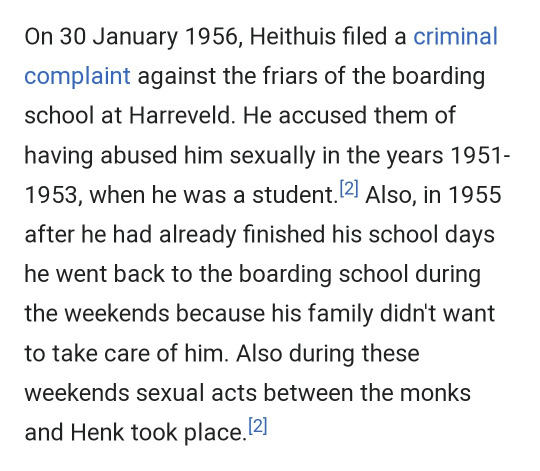

And again, Christianity has a longstanding pederastic tradition in their art as well. See, depictions of angels, John the Evangelist, St. Sebastian, sometimes Jesus himself.
See also, this very poignant book, which talks a lot about the way children were responsibilized for men’s sexual feelings, especially child oblates.
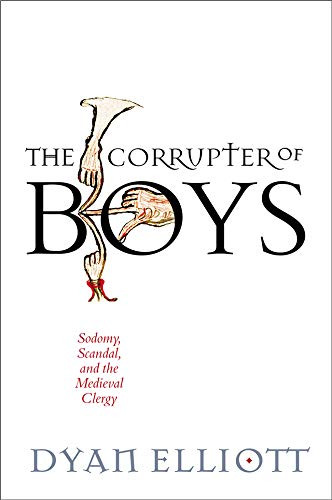
Stories like this seemed to imply that a child should want to die or disfigure themselves before provoking ill thoughts in their elders. So, to claim Christianity rejected this altogether, is ridiculous.
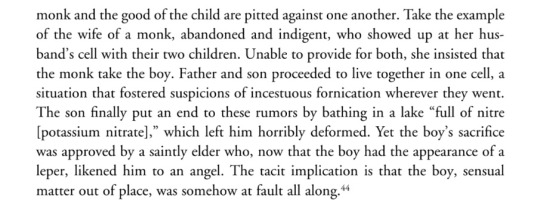
If you consider the child perspective to be as important as that of the adult obviously, which Paglia does not.
She repeatedly defended CSAM, which is only natural for someone that believes that children are sexual objects whose main purpose is representing an ideal of beauty and being lusted after.
She praised the book Lolita, thinking that is is favorable to the protagonist and his behavior, when in reality it is the opposite; it explicitly condemns the reduction of children as sexual objects that her writing encourages. It is explicitly inspired by the real life case of adult sexual violence against a girl named Sally Horner. The author explicitly said that he did not want any pictures of young girls on the cover to feed the objectification of them that Humbert justifies throughout the book.
Adult publishers preferred representations of this sort instead. Our culture hammers us with the message that children are a temptation to be kept under check. See the cover of her holding an apple, the fruit most tied to sexual “sin.”
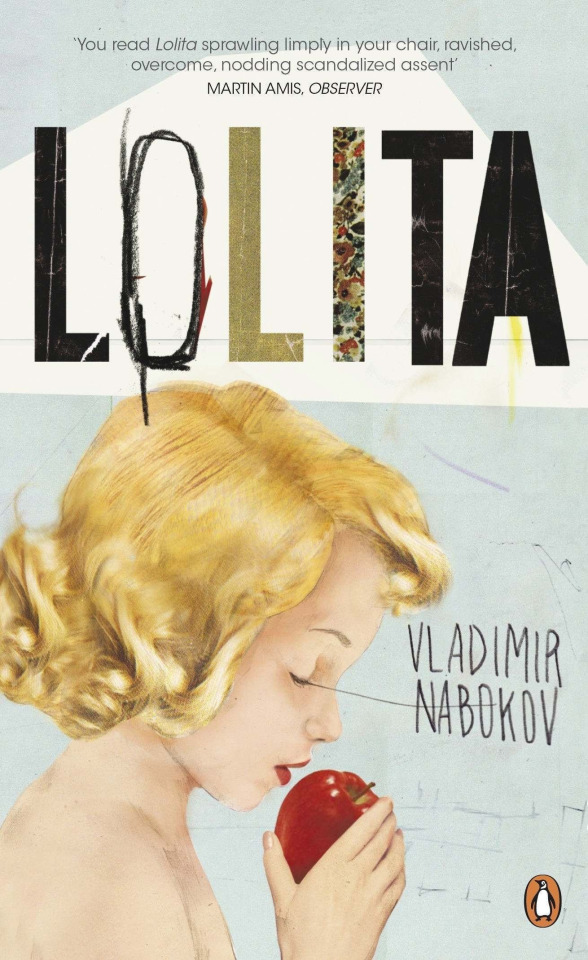
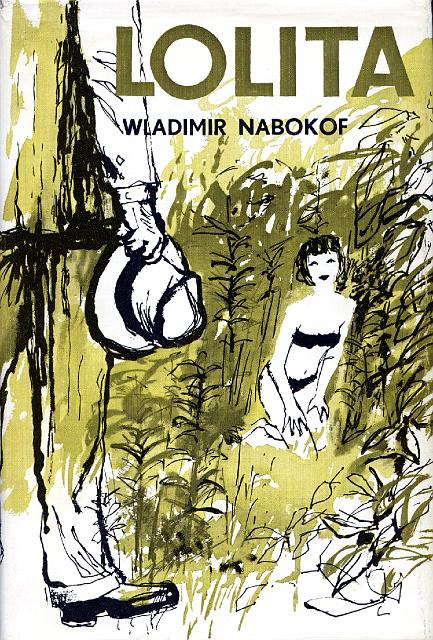

This is why I have a profound distaste for “sexualisation” debates; they’re just a seemingly progressive reiteration of this rhetoric.
https://twitter.com/aubedete/status/1559511280200867840
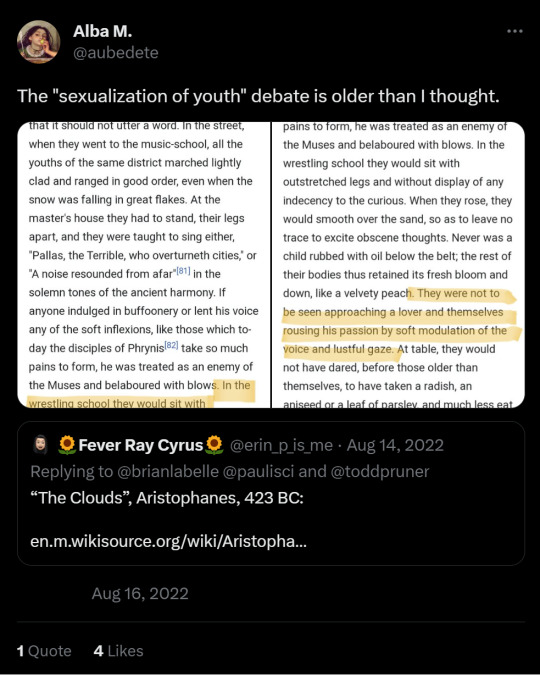
https://en.wikisource.org/wiki/Aristophanes:_The_Eleven_Comedies/Clouds
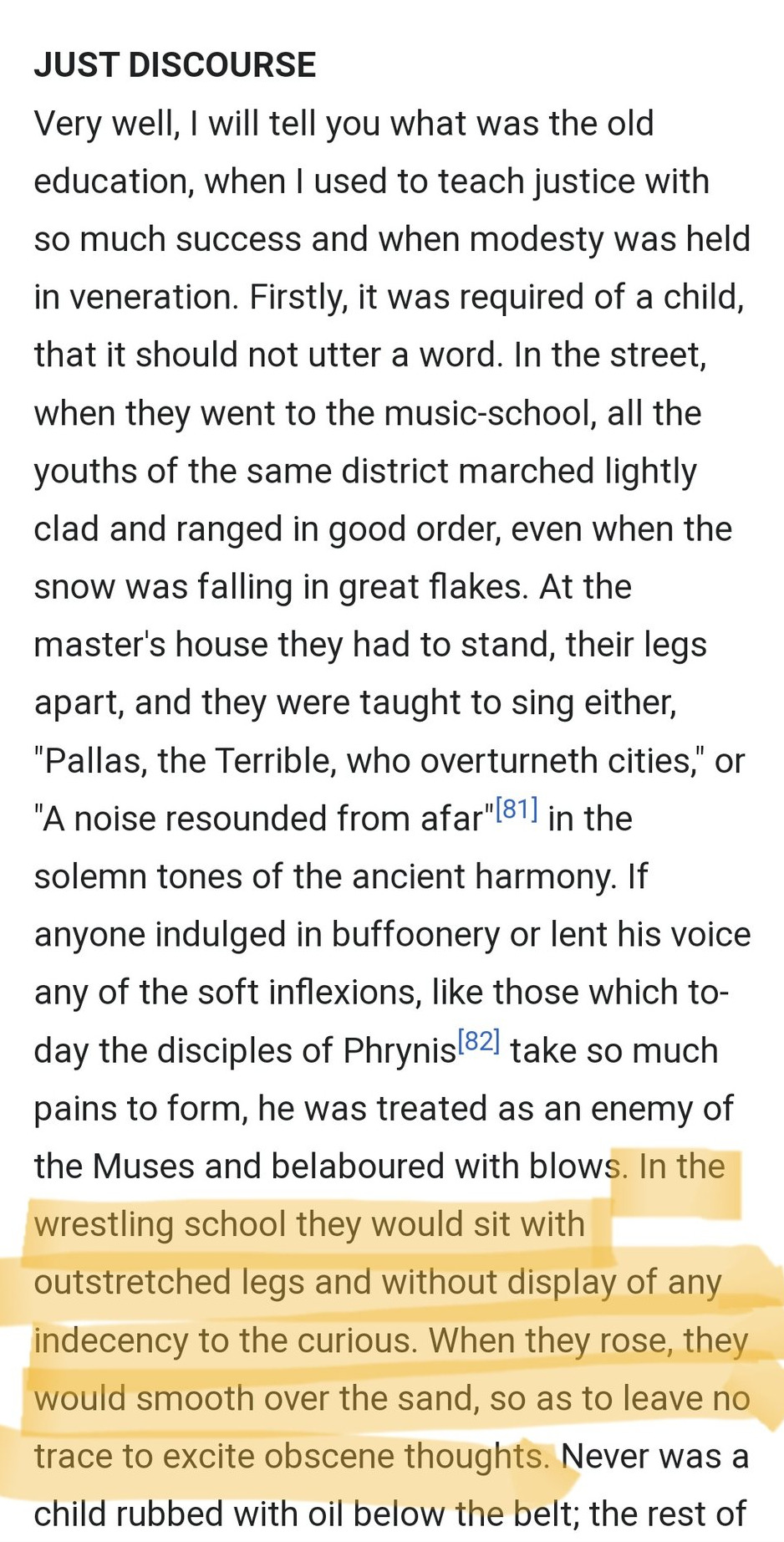
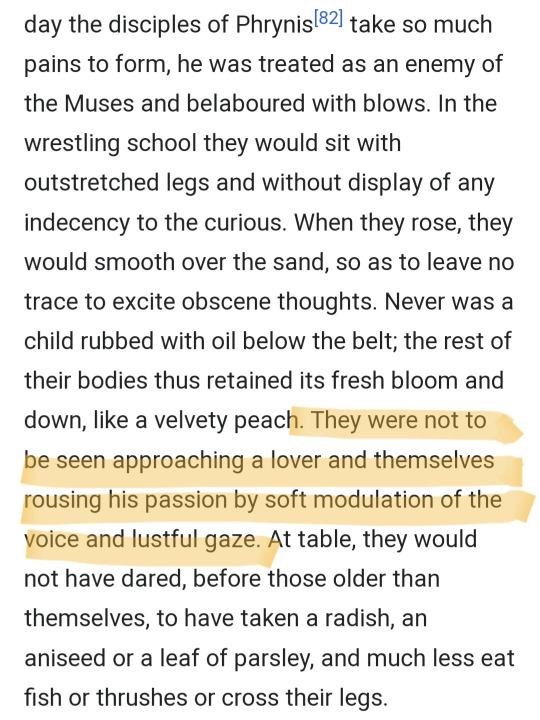
They are about making sure children do not tempt adults, even if it is masked as a concern “for their safety.” The behavior of the adult is not scrutinised, only that of the child is, as if sexualized misopedy was a natural fact of life (which is what Paglia believes, and while for most of the people that take part in that debate that is a negative side of “nature,” for her it is a positive one that should be expressed, like misogyny, and that certain people (feminists) are trying to repress, out of a “hatred for men/nature”).
She expressed support for groups like NAMbLA and people like Allen Ginsberg because she saw them as “brave heroes” resisting the castration of a society that seems to be criticising their unquestioned sexual access to young people’s bodies a little bit more.
She constantly refers to this as “lynching mentality” and a “witch hunt,” which mirrors rhetoric (including her own rhetoric) about the #MeToo movement, which is disrespectful in itself since the vast majority of witch hunt victims in history and now were children and women.
The objection still could be that this is not a reflection of misopedy, but Paglia repeatedly stated children have “demonic imaginations” and “love violence,” of course, they are the perverts tainted by original sin that need to be tamed, they are the ones who secretly beg for their own abuse.
Paglia believed that men sacrificed their lives for children throughout history (when? The history of childhood is a nightmare without end, as deMause showed), and that children are perverse. Therefore children owe them, and they “enjoy it anyway.”
Nice quotes from her about children:
“Children are monsters of unbridled egotism and will, for they spring directly from nature, hostile intimations of immorality.”
It’s curious that she would criticize Christian morality when this is textbook Christian morality. I guess it is only bad when Christian morality inconveniences adult men (or when she thinks it does).
See:
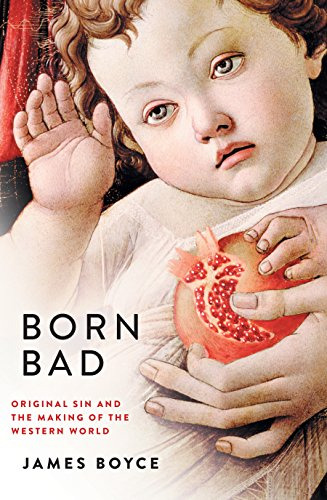
I also find it pretty ironic that she subscribed to the idea that feminists were waging a “war on boys” when she had a deep seated belief that boys are sexual objects, empty vessels, and evil and perverse at heart. She is on the side of millennia long war on boys, not a made up “feminist” one.
One more reason to remember Mozart as the child who flung adults into panic with his abilities that “defied his age” according to a misopedic public rather than this talking point against feminism. Also check out his sister.
note from reposter: I think a key point Alba missed here is the invocation of “Judeo-Christian culture,” collapsing Judaism and Christianity as sharing common material and moral interests, despite the long history of Christians’ antisemitic persecution of Jews. A popular rightwing dogwhistle for Christian fundies who claim to support “Judeo-Christian values,” and also popular terminology among the return-to-trad-paganism types like Paglia who claim to oppose both.
12 notes
·
View notes
Photo
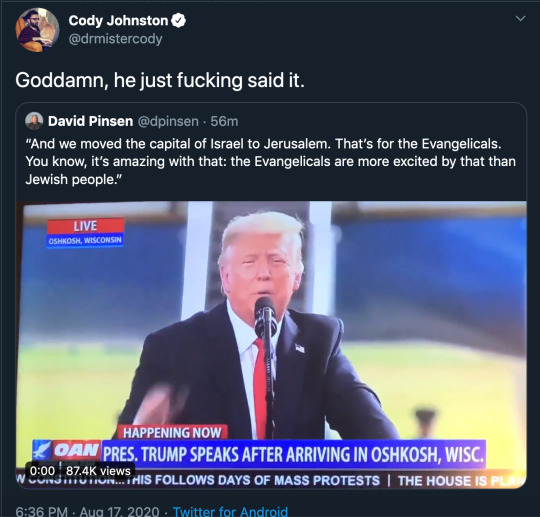
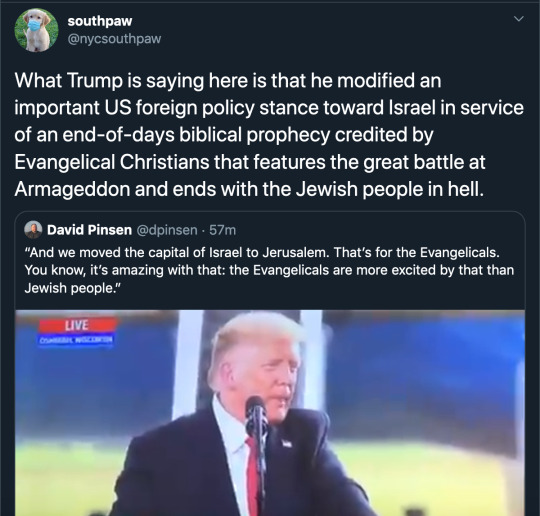
[ID: two tweets reacting to a video clip by Trump speaking in Oshkosh, Wisconsin.
The initial tweet by @dpinsen includes the video clip of Trump and captions it by quoting Trump saying “And we moved the capital of Israel to Jerusalem. That’s for the Evangelicals. You know, it’s amazing with that: the Evangelicals are more excited by that than Jewish people.”
The first picture shows the response by @drmistercody who tweeted “Goddamn, he just fucking said it.”
The second picture shows the response by @nycsouthpaw reading “What Trump is saying here is that he modified an important US foreign policy stance toward Israel in service of an end-of-days biblical prophecy credited by Evangelical Christians that features the great battle at Armageddon and ends with the Jewish people in hell.”
End ID]
5K notes
·
View notes
Note
The idea that cynthia McKinney was an antisemite is just more proof of your milquetoast centrist liberalism. You're an absolute joke. You have never been part of the left and never will
Southern Poverty Law Center:
In March of this year [2009], [McKinney] attended a conference in London on the Gaza crisis organized by a foundation established by Mahathir Mohamad, who was prime minister of Malaysia from 1981 to 2003 and has a long history of anti-Jewish rhetoric. In a 1970 book, Mahathir wrote that “Jewish stinginess and financial wizardry gained them financial control of Europe” and that Jews “are not merely hook-nosed, but understand money instinctively.” In a 2003 speech at an international summit of Islamic leaders, he said: “Today, the Jews rule the world by proxy. They get others to fight and die for them. They invented socialism, communism, human rights and democracy to avoid persecution and gain … control of the most powerful countries.”
McKinney commented about the London conference in two postings on the Green Party’s website in which she praised Mahathir (“one of my heroes”) and also a man named David Pidcock, whom she called “my London friend.” A British-born convert to Islam, Pidcock is the author of an extensive collection of conspiracy-laden anti-Semitic works, including the 1992 work Satanic Voices Ancient & Modern, which blames most of the world’s current and ancient problems on a centuries-old conspiracy whose participants include Freemasons, Illuminati, “Luciferian Zionists,” the Rockefeller family, big oil companies and the Council on Foreign Relations. The principal Internet outlet for Pidcock’s writings is the website iamthewitness.com, which is devoted to fascist and anti-Semitic writings, prominently featuring The International Jew published by Henry Ford.
At the conference, McKinney was photographed with Pidcock and Michele Renouf, a former model and socialite who is considered one of Britain’s leading Holocaust-denial activists.
On April 20, McKinney posted another commentary on the Green Party site, this time focusing on the international economy. The essay essentially accused financier George Soros and former Federal Reserve Chairman Alan Greenspan (both of whom are Jewish) of participating in a plot to destabilize the world economy to pave the way for “one-world government.” She used a term from a writer named Matthias Chang to describe the principals of this conspiracy — “the Shadow Money-Lenders” — that also is the title of Chang’s latest book. She praised the book and quoted from it extensively.
Matthias Chang is a Malaysian lawyer, a Catholic of Chinese ancestry, who served as an adviser to former Prime Minister Mahathir and remains his close associate. In The Shadow Money-Lenders, Chang avoids the rhetorical excesses of the less subtle Jew-haters. But his description of the financial conspiracy is well salted with names of various Jewish bankers past and present (Kuhn, Loeb, Warburg, and so on). Chang’s sentiments were clearer in 2006, when he submitted remarks to be read to a “Free Speech” conference in Washington, D.C., organized jointly by The Barnes Review and American Free Press.
The Barnes Review, whose website homepage promotes Chang’s books, is a journal specializing in Holocaust denial started in 1994 by long-time white supremacist and anti-Semite Willis Carto; the American Free Press, which began publishing in 2001, was also started by Carto and specializes in anti-Semitic material and conspiracy theories. Chang was unable to attend in person, so his remarks were read by Michael Collins Piper, a writer and contributor to the American Free Press whose main claim to fame is his theory that Israeli spies were behind the assassination of President John F. Kennedy.
Chang’s remarks, which are posted on his website, included a shout-out to a remarkable group of haters, Holocaust deniers and conspiracy theorists: “American Free Press, The Barnes Review, The Spotlight, and the truth seekers that I have long admired, Harry Elmer Barnes, Willis Carto, Michael Collins Piper, Christopher Petherick [and] Eustace Mullins (whose life-long persecution by the Police State is a disgrace to the Constitution).” Some of those names are more familiar than others, but take Mullins, for example. Among his writings over the years are declarations that Jews are literally descended from Satan and that they “drink the blood of an innocent gentile child” in religious ceremonies.
72 notes
·
View notes
Text
if your leftism doesn’t include fighting antisemitism then I’m really not interested in your leftism
91K notes
·
View notes
Photo

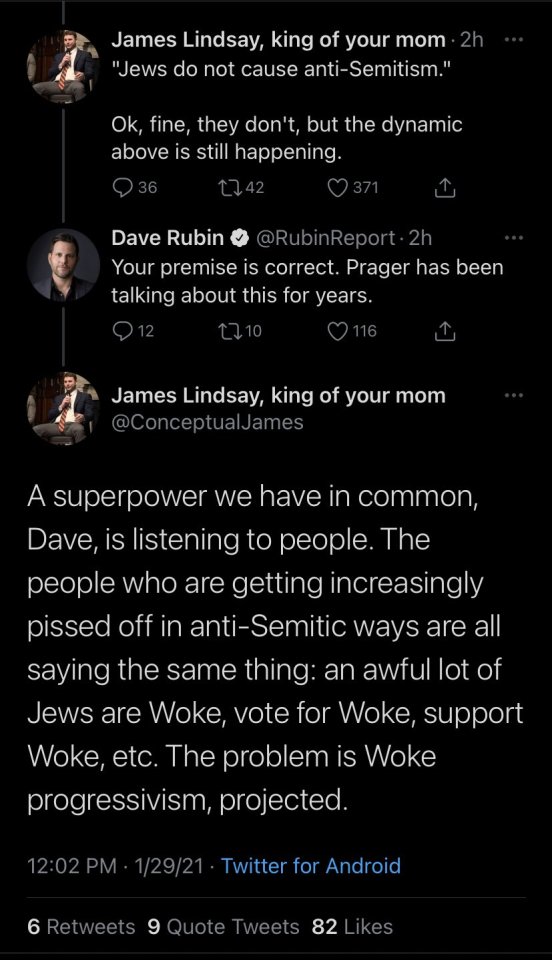
Here we have two boneheads who think that if Jews stop being antiracist, anti sexist, anti homophobic, etc, that the right will stop hating Jews. Even putting aside the fact that people hate Jews no matter what we do, this completely ignores antisemitism from other political factions. Some people on the left are antisemitic because they wrongly believe that Jews are oppressors by virtue of being Jewish. It’s what happened in the Soviet Union, where Jews were accused of being pro capitalist (Where as in the west at that time, Jews were accused of being communist). If Jews followed James and Dave Rubin’s advice, that would not stop antisemitsm from the left.
Also, stopping antisemitism comes from solidarity. Fuck whatever the hell this is.
14 notes
·
View notes
Text
I deal with some goyishe leftist bullshit at least once a month and there are leftist Jews who tell me that antisemitism on the left isn’t a problem.
15 notes
·
View notes
Text
The Palestine Reader
The following is a collection of articles, essays, and books on Palestine. These are not introduction texts to the question of Palestine or the Palestinain-Israeli “conflict”. If you need one read The Palestine-Israel Conflict by Gregory Harms and Todd Fery. Further, this is not an “unbiased” or “neutral” readng list. Everything listed below is counter-hegemonic. I feel absolutely no need to provide anything from the Zionist or Israeli point-of-view when that is the dominant narrative. With that said, I believe this provides a diverse, but in no means comprehensive, overview of the discourse on Palestine. A continuously updated page of this list can be found here.
On Theory
Orientalism by Edward Said
Orientalism Reconsidered by Edward Said
The Question of Palestine by Edward Said
Reading Said in Hebrew by Ella Shohat
Notes on the “Post-Colonial” by Ella Shohat
On History
History of Palestine by Dr. Mohsen Mohammed Saleh
Sabra and Shatila: September 1982 by Bayan Nuwayhed al-Hout
Peace and its Discontents by Edward Said
On Being Palestinian
What It Means to be Palestinian by Dina Matar
A Narrative of Palestinian Dispossession by Samia Costandi
The Palestinian Exile as Writer by Jabra I. Jabra
My People Shall Live by Leila Khaled
Memoirs, 1948 Part I by Fauzi Al-Qawuqji
Memoirs, 1948 Part II
Palestinian Identity and the Performance of Catastrophe by Ihab Saloul
On Zionism
Zionism from the Standpoint of its Victims by Edward Said
Zionism from the Standpoint of its Jewish Victims by Ella Shohat
Jewishness and the Critique of Zionism by Judith Butler
The Invention of the Mizrahim by Ella Shohat
Jewish Fundamentalism in Israel by Israel Shahak and Norton Mezvinsky
Jewish History, Jewish Religion by Israel Shahak
The Ends of Zionism by Joseph Massad
The Persistence of the Palestinian Question by Joseph Massad
On Imperialism and Settler Colonialism in West Asia by Jamil Hilal
The Hidden History of Zionism by Ralph Schoenman
How the Zionists Took Over Palestine by Adel Safty
Imperial Israel and the Palestinians by Nur Masalha
After Zionism by Antony Loewenstein and Ahmed Moor
On the Holocaust
Respecting the Holocaust by Howard Zinn
The Holocaust: Learning the Wrong Lessons by Boaz Evron
The Victimhood of the Powerful by Jennifer Peto
On Media
Propaganda, Perception, and Reality by William A. Cook
Israeli Cinema an interview with Ella Shohat
Israeli Cinema by Ella Shohat
Palestinian Cinema by Nurith Gertz and George Khleifi
On Al Nakba
The 1948 Ethnic Cleansing of Palestine by Ilan Pappe
The Ethnic Cleansing of Palestine by Ilan Pappe
The Saga of Deir Yassin
The Fall of Lydda by Spiro Munayyer
Returning to Kafr Bir'im
How Palestine became Israel by Stephen Hallbrook
The Palestinian Exodus of 1948 by Simha Flapan
Why Did the Palestinians Leave by Walid Khalidi
Selected Documents on 1948
The Limits of the New Israeli History by Joel Beinin
On Genocide
Genocide or Erasure of Palestinians by Kathleen and Bill Christison
Israel’s Slow-Motion Genocide in Occupied Palestine by Steve Lendman
Ongoing Palestinian Genocide by Gideon Polya
The Lessons of Violence by Chris Hedges
The Brutal Siege of Gaza Can Only Breed Violence by Karen Koning AbuZayd
The Olive Trees of Palestine Weep by Sonja Karkar
Slouching toward a Palestinian Holocaust by Richard Falk
Gaza is Dying by Patrick Cockburn
Israeli Immunity for Genocide by Andrea Howard
Palestinian Misery in Perspective by Paul De Rooij
A Slow, Steady Genocide an interview with Tanya Reinhart
Gaza’s Holocaust by Dr. Elias Akleh
Genocide Hides Behind Expulsion by Adi Ophir
The British in Palestine, A Conveniently Forgotten Holocaust by Robert Fisk
European Collusion in Israel’s Slow Genocide by Omar Barghouti
Genocide in Gaza by Ilan Pappe
Genocide Among Us by Curtis F. J. Doebbler
Bleaching the Attrocities of Genocide by Kim Petersen
The Rape of Palestine by William A. Cook
Israel Plots Another Palestinian Exodus by Jonathan Cook
Slow Motion Ethnic Cleansing by Uri Avnery
Disappearing Palestine by Jonathan Cook
The Problem With Israel by Jeff Halper
Gaza in Crisis by Noam Chomsky and Ilan Pappe
Drying Out the Palestinians
Israel’s Latest Assault on Gaza by Norman Finkelstein
To Gaza I Did Not Go by Gideon Levy
Gaza, the World’s Largest Open-Air Prison by Noam Chomsky
The Most Humane Little Checkpoint by Amira Hass
On BDS
BDS: Winning Justice for the Palestinian People
Why Boycott Israeli Universities?
The Necessity of Cultural Boycott by Ilan Pappe
Companies Supporting Israeli Occupation
On Solutions
Two-State Illusion by Ian S. Lustick
Relative Humanity: The Essential Obstacle to a One-State Solution by Omar Barghouti
Where Now For Palestine? by Jamil Hilal
23K notes
·
View notes
Text
‘antisemitism’ has been trending on french twitter for the past 3 days, the RN party is blaming covid on jewish people, other far right activists have put up a website which lists all of the most influencial french jewish personalities, about half of french cops and militaries support the rn and about half of the french population aren’t scared about the rn winning the elections, i talk to my friends and they are scared about getting beat up by fascists if they continue being openly far left, communists’ houses are regularly being searched by the police, i am so tired of everything we are really not going to make it out of there huh..
3K notes
·
View notes
Text
Neocons: I can’t be antisemitic because I support Israel.
Also necons: We need to nuke Iran. It’s not like there’s over 8,000 Jews who live in that country.
6 notes
·
View notes
Text
Conservatives: Most of the people who are attacking Jews and Asians in America are black and the left still thinks it’s white supremacy that is the main problem for Asians and Jews.
Me: Putting aside whether that’s true or not, black people who do this are still acting on white supremacy.
223 notes
·
View notes
Photo




[Images description: A Twitter thread by Rabbi Mike Rothbaum (@ Rav_Mike) that says the following:
1) “Our local schools are plagued by antisemitism. There’s a speaker engaged by a local shul ostensibly to discuss antisemitism. ¾ of the talk is about defending Israel. My students aren’t targeted for Zionism. They’re targeted for being Jews. They need safety, not talking points.
2) There’s nothing here for my students who see swastikas in school. There’s nothing here for the kid who was told by a classmate that he’d buy him an “Easy bake oven” for Chanukah. There’s nothing here for the kid who had money thrown at them and told “pick it up you f***ing Jew.
3) You’re entitled to defend the actions of the Israeli government. You’re not entitled to hijack the topic of antisemitism to do so. It’s an abdication of our responsibility to support and defend our kids who deal with Jew-hatred every day. It’s a shonde.
4) The state of Israel has an army and a professional staff of PR professionals to defend it. All my students have are fellow Jews and our allies. Don’t abandon them.
5) After a desultory reference to Charlottesville, the speaker decried “Black Lives Matter,” Stephen Jackson, and Puff Daddy. Puff Daddy didn’t tell his Instagram followers to “like and subscribe to kill one Jew.” That was a white kid my students go to school with. [This tweet has a screenshot of an Instagram live with chat messages. The last message is from michael_13_0 and it’s pinned. It says “Like and subscribe to kill one jew”.]
6) Thing is, I KNOW this stuff is heavily funded by Jewish legacy orgs. And it really is the last thing we need to spend our Jewish dollars on. There’s so much we could be doing to support Jewish learning, students, families, elders, queer folks, Jews of Color. Israel PR ain’t it.
7) The last straw was when the speaker said we should be protecting Israel-advocating students on campus, not “counting swastikas in Idaho.“ Counting swastikas is EXACTLY what we should be doing. Jews live in Idaho – and Middlesex county – and we need to love and protect them.”
end ID]
4K notes
·
View notes
Photo




[Images description: A Twitter thread by Rabbi Mike Rothbaum (@ Rav_Mike) that says the following:
1) “Our local schools are plagued by antisemitism. There’s a speaker engaged by a local shul ostensibly to discuss antisemitism. ¾ of the talk is about defending Israel. My students aren’t targeted for Zionism. They’re targeted for being Jews. They need safety, not talking points.
2) There’s nothing here for my students who see swastikas in school. There’s nothing here for the kid who was told by a classmate that he’d buy him an “Easy bake oven” for Chanukah. There’s nothing here for the kid who had money thrown at them and told “pick it up you f***ing Jew.
3) You’re entitled to defend the actions of the Israeli government. You’re not entitled to hijack the topic of antisemitism to do so. It’s an abdication of our responsibility to support and defend our kids who deal with Jew-hatred every day. It’s a shonde.
4) The state of Israel has an army and a professional staff of PR professionals to defend it. All my students have are fellow Jews and our allies. Don’t abandon them.
5) After a desultory reference to Charlottesville, the speaker decried “Black Lives Matter,” Stephen Jackson, and Puff Daddy. Puff Daddy didn’t tell his Instagram followers to “like and subscribe to kill one Jew.” That was a white kid my students go to school with. [This tweet has a screenshot of an Instagram live with chat messages. The last message is from michael_13_0 and it’s pinned. It says “Like and subscribe to kill one jew”.]
6) Thing is, I KNOW this stuff is heavily funded by Jewish legacy orgs. And it really is the last thing we need to spend our Jewish dollars on. There’s so much we could be doing to support Jewish learning, students, families, elders, queer folks, Jews of Color. Israel PR ain’t it.
7) The last straw was when the speaker said we should be protecting Israel-advocating students on campus, not “counting swastikas in Idaho.“ Counting swastikas is EXACTLY what we should be doing. Jews live in Idaho – and Middlesex county – and we need to love and protect them.”
end ID]
4K notes
·
View notes
Text

Way, way too much going on in this latest Trump quote from his interviews with Barak Ravid
222 notes
·
View notes
Text
I'm trying to figure out how to word this but I think there's a brand of antisemitism, connected to seeing us as having more power than we do ie secret cabal running the world, that believes all Jews can be pawns to fight against American imperialism because of the state of Israel. The focus here should be on the victims and antisemitism, I want to, however, analyze the antisemitism which links all Jews to power and then all this power to the state of Israel. (Israel is an apartheid ethnostate and that is not to be debated).
Anyways, the gunman believed holding Jews hostage would provide leverage to free Aafia Siddiqui, a Pakistani woman who was wrongly accused by the US government of being a part of Al Qaeda, imprisoned, and physically assaulted and injured, and brutally tortured on trumped up charges of terrorism.
When Siddiqui was forced to stand trail, after being assaulted to the point of missing a kidney, having her teeth knocked out and broken, missing part of her intestine, and in a wheelchair, in addition to the substantial psychological torture by the government, she said a throwaway antisemitic remark. “This is a verdict coming from Israel, not America. That’s where the anger belongs. I can testify to this. And I have proof."
Is antisemitism excusable, no. Is the logic applied here linked to antisemitic ideas dating back to "the protocols of the elders of Zion" except Jew has been replaced with Israel, yes. But even the US government believed she was mentally unstable and not fit to stand trail, but wanted her to anyways because it would be easier to convict her that way.
Now, one could assume that perhaps the gunman heard and took seriously Siddiqui's remark, in which she was too mentally unstable to stand trail when said, and took seriously the implication that Israel and by extension in this logic of antisemitism, Jews were the key to freeing a wrongfully imprisoned Muslim woman.
Am I saying all this to humanize the gunman, not in the slightest. He does not deserve sympathy for latching onto an antisemitic idea said by a woman under extreme mental duress and taking it seriously to the point that he decided that holding 4 Jews hostage at Beth Israel in Texas would free her. He is responsible for kidnapping, holding hostage, and putting Jewish lives at risk of harm because of his delusional antisemitism.
It's possible he came up with this idea completely independent of Siddiqui's comment because the idea that Jews have more power than we do is an extremely widespread antisemitic conspiracy theory. I make the connection however because the antisemitic rhetoric is very similar, stems from the same antisemitic origin, and is connected to Siddiqui, the woman the gunman was trying to save with his antisemitism.
The US government have committed unspeakable violence against Muslims like Siddiqui, please read the entirety of this, scrupulously outlining her life, wrongful accusation, imprisonment and torture. I say this not in any defense but to give context to all of the above. Israel has also committed heinous crimes which is both ideologically and financially supported by the United States. This stands then to have a conversation about how this connection is weaponized, as are literal Jewish lives and bodies, against Jewish Americans. And that the United States and Israeli violence, imperialism, and terror, contributes to the false justification of antisemitic tropes.
315 notes
·
View notes
Text
So a school board in Tennessee banned Maus, which is a book about the Holocaust, and an anti CRT “journalist” said it was fake news and said “The journalistic culture of the NYT shouldn’t colonize the curriculum of a small school in Tennessee” which, in addition to minimizing actual colonialism, is coded with antisemitism.
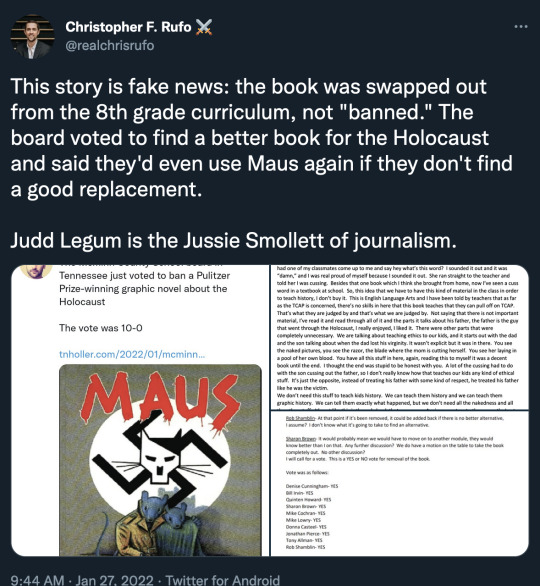
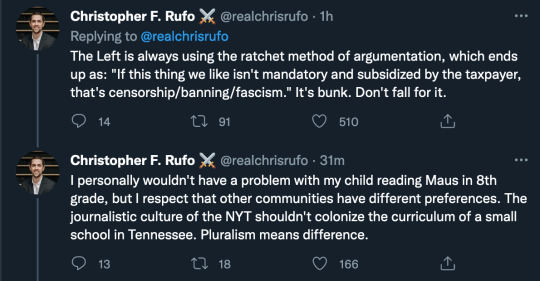
14 notes
·
View notes

